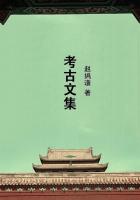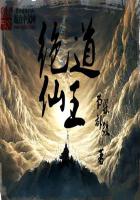Rumours had reached them that someone had escaped from Bonsa Town; they thought it was the Mungana. Fahni asked who had brought the rumour, whereon the headman answered that it came "in a dream," and would say no more. Then he demanded the canoe which had been promised to him and his people, and the headman admitted that it was ready in accordance with orders received from the Asika, but demurred to letting him have it. A long argument followed, in the midst of which Fahni and his men got into the canoe, the headman apparently not daring to use force to prevent him. Just as they were pushing off a messenger arrived from Bonsa Town, reeling with exhaustion and his tongue hanging from his jaws, who called out that it was the white man who had escaped with his servant and the Mungana, and that although they were believed to be still hidden in the holy woods near Bonsa Town, none were to be allowed to leave the bay. So the headman shouted to Fahni to return, but he pretended not to hear and rowed away, nor did anyone attempt to follow him. Still it was only after nightfall that he dared to put the boat about and return to the headland to pick up Alan and the others as he had promised. That was all he had to say.
Alan thanked him heartily for his faithfulness and they paddled on steadily, putting mile after mile of water between them and Asiki- land. He wondered whether he had seen the last of that country and its inhabitants. Something within him answered No. He was sure that the Asika would not allow him to depart in peace without ****** some desperate effort to recapture him. Far as he was away, it seemed to him that he could feel her fury hanging over him like a cloud, a cloud that would burst in a rain of blood. Doubtless it would have burst already had it not been for the accident that he and his companions were still supposed to be hiding in the woods. But that error must be discovered, and then would come the pursuit.
He looked at the full moon shining upon him and reflected that at this very hour he should have been seated upon the chair of state, wedding, or rather being wedded by the Asika in the presence of Big and Little Bonsa and all the people. His eye fell upon the Mungana, who had also been destined to play a prominent part in that ceremony. At once he saw that there was something wrong with the man. A curious change had come over his emaciated face. It was working like that of a maniac.
Foam appeared upon his dyed lips, his haunted eyes rolled, his thin hands gripped the side of the canoe and he began to sing, or rather howl like a dog baying at the stars. Jeekie hit him on the head and bade him be silent, but he took no notice, even when he hit him again more heavily. Presently came the climax. The man sprang up in the canoe, causing it to rock from side to side. He pointed to the full moon above and howled more loudly than before; he pointed to something that he seemed to see in the air near by and gibbered as though in terror. Then his eyes fixed themselves upon the water at which he stared.
Harder and harder he stared, his head sinking lower every moment, till at length without another sound, very quietly and unexpectedly he went over the side of the boat. For a few seconds they saw his bright- coloured garments sinking to the depths, then he vanished.
They waited a while, expecting that he would rise again. But he never rose. A shot-weighted corpse could not have disappeared more finally and completely. The thing was very awful, and for a while there was silence, which as usual was broken by Jeekie.
"That gay dog gone," he said in a reflective voice. "All those old ghosts come to fetch him at proper time. No good run away from ghosts; they travel too quick; one jump, and pop up where you no expect. Well, more place for Jeekie now," and he spread himself out comfortably in the empty seat, adding, "like hello-swello's room much better than company, he go in scent-bath every day and stink too much, all that water never wash /him/ clean."















